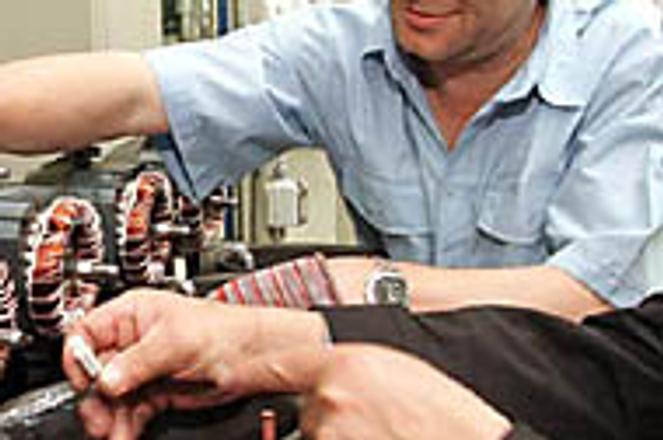Embraco, which has settled in Spišská Nová Ves, is the largest Italian investor in Slovakia.photo: TASR
"Nobody looks at small firms here, only large ones. The bigger firms can have as much as they want, but the small firms have difficulties even getting a loan."
Mario Bedin, managing director of the BCB aluminium smelter and president of the Italian Business Association, is sitting in the Italian Ristorante Alvarez, on the outskirts of Bratislava. His almost resigned tone as he discusses the problems facing small firms stands out against the energetic hum of the Italian spoken by his fellow countrymen at other tables.
The restaurant has become a meeting place for Italian businessmen in Slovakia. But as Bedin explains, the diners are more likely to be talking about what they claim is poor government incentives for them than the quality of the imported chianti wine.
Italian investment in Slovakia doubled in 2000, bringing the total Italian direct foreign investment (FDI) in the country to 2.66 billion Slovak crowns ($56.1 million), and making Italy the ninth largest investor into Slovakia. This year, even more firms have announced plans to pump FDI dollars into the country and add to the 300 Italian businesses already set up here.
Chemical company Gruppo Bonazzi, which already controls the Považské chemické závody firm in central Slovakia and eastern Slovak firm Cenon, has said it is to expand this year. Three other Italian firms - Sogit, Pazel and Scame - have said they want to invest into an industrial zone planned to serve the washing machine producer, Whirlpool, in the northern Slovak town of Poprad.
But while these last three will be able to qualify for investment incentives offered to larger investors, many Italian firms, says Bedin, are too small to meet the requirements. A new tax incentive scheme recently approved by the government offers 10-year, 100% tax breaks only to firms making investments of between 200 and 400 million crowns ($4 million to $8 million), depending on the unemployment rate of the location in which they settle.
Many small and medium-sized enterprises (SMEs), not having the capital to meet the investment peg, are thus ineligible for the tax breaks. It's a problem which angers Italian firms investing here, more than 80% of whom are SMEs.
"Economic incentives here aren't suitable for Italian investors. The benefits the government is giving to investors are meant only for large firms," agreed Peter Navračič of the Slovak Economy Ministry.
Over 96% of all Italian companies qualify as either small or medium-sized.
Government agreement
Government representatives make no secret of their bent towards larger investors, despite recognising the importance SMEs play in most western economies.
"The government must focus on attracting larger foreign businesses to Slovakia. Once such investors set up businesses here, they prepare an economic environment for the subsequent entry of smaller and medium-sized investors as suppliers," said Jorgen Varkonda, head of the FDI department at national investment agency SARIO.
Some analysts agree with the strategy. "These [incentives] shouldn't be important for smaller firms because they can earn enough money here by taking advantage of cheap labour and low operating costs anyway," said Ján Tóth, an analyst with ING Bank in Bratislava.
Despite the government's policy, Italian firms still want to come to Slovakia. While officials from both the Italian Embassy and Chamber of Commerce in Bratislava say they want more from the Slovak government in the way of incentives for SMEs, they agree there are other reasons why Italian firms will continue to come to Slovakia, regardless of what breaks are on offer.
"Italian investors who come here are mainly attracted by the geographical location in the middle of Europe, which makes exports easier as they are closer to other markets, and the skilled, flexible and cheap labour and good infrastructure," a spokesman for the Italian embassy said.
Fabrizio Paoletti, head of the Italian Chamber of Commerce, said that many Italian firms had expansion plans that would take in central Europe, with or without 10-year tax breaks.
New investor?
Italian investment may soon be upped more dramatically. On June 13 the government received a bid for a 69% stake in state bank Všeobecná úverová banka (VÚB) from Italian bank IntesaBci, along with French Societe Generale. Observers in the banking sector say that the bids may be as high as 14 billion crowns.
But an IntesaBci victory could bring in more than just money, as investment from other Italian firms is expected to follow if the bank wins the VÚB tender.
"If chosen as majority shareholder for VÚB, we will raise economic activity between Italy and Slovakia and attract more Italian SMEs here, since our clients would feel more protected by our presence," Enrico Meucci, Intesa's general director, said in an interview with The Slovak Spectator.
The presence of Italian bank UniCredito, which bought into Slovak bank Poľnobanka last year, has already helped Italian SMEs, said Bedin. Many smaller firms, not just Italian, have complained that they cannot obtain loans cheap enough to finance expansion.
"Having this bank here guarantees financial stability for Italian investors. We can address our requests to them, and quickly solve problems typical for the Slovak business environment," said Bedin.


